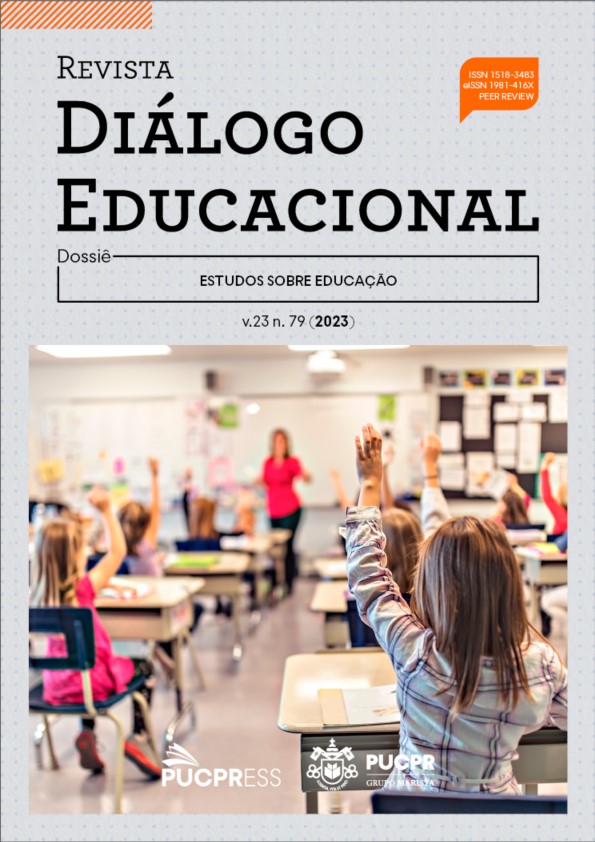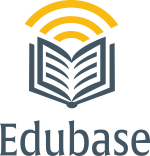Arquitetura Pedagógica Inclusiva e Pensamento Computacional
DOI:
https://doi.org/10.7213/1981-416X.23.079.AO04Resumo
O artigo foi desenvolvido a partir de um recorte de uma pesquisa de doutoramento, cujo enfoque deu-se na formação continuada docente. O estudo mostra resultados do curso “A abordagem do Pensamento Computacional na Educação Inclusiva” envolvendo o Pensamento Computacional aplicado em atividades escolares. Para tanto, constituiu-se uma Arquitetura Pedagógica para a formação continuada de professores de escolas da educação básica. A formulação de uma Arquitetura Pedagógica inclusiva, em um ambiente on-line, usou o Pensamento Computacional com o objetivo de desenvolver propostas pedagógicas para pessoas com deficiência. A metodologia aplicada foi quantitativa e qualitativa, de carácter exploratório, fundamentada na Design-Based Research, dividida em três etapas, estudo preliminar, período exploratório e fase final. Os resultados do período exploratório contaram com a realização de um curso de trinta horas, com dez encontros on-line síncronos e assíncronos. Contou com a participação efetiva de 10 professores de diversos níveis educacionais, com formações variadas. Neste trabalho, priorizou-se a análise do discurso das propostas constituídas durante o curso. Os resultados mostram a complexidade de um ecossistema de aprendizagem, as possibilidades de enriquecer a prática pedagógica no formato aplicado. Também, apontou para a necessidade de se investir na formação docente para o uso do Pensamento Computacional, principalmente, em escolas da educação básica.
Downloads
Referências
BAKHTIN, M. (VOLOCHÍNOV). Marxismo e filosofia da linguagem. Problemas fundamentais do método sociológico na ciência da linguagem (1929). Trad. Michel Lahud e Yara Frateschi Vieira. 13 ed. São Paulo: Hucitec, 2009.
BARAB, S., & SQUIRE, K. Pesquisa baseada em design: colocando uma estaca no chão. O jornal das ciências da aprendizagem, 2004, 13 (1), 1-14.
BATESON, G. Steps to an ecology of mind London: Chandler publications, 1972.
BRASIL. Lei de diretrizes e bases da educação nacional nº. 9.394. Brasília, DF, 1996.
BRASIL. Lei Nº 13.146, de 6 de julho de 2015. Lei Brasileira de Inclusão da Pessoa com Deficiência (Estatuto da Pessoa com Deficiência). Diário Oficial da União: seção 1, Brasília, DF, n. 127, 2021, p. 2-11, 7 jul.
BRASIL. LEI Nº 14.533. Política Nacional de Educação Digital, 2023. https://www.in.gov.br/web/dou/-/lei-n-14.533-de-11-de-janeiro-de-2023-457334986.
CARVALHO, M. J. S., NEVADO. R. A. & MENESES. C. S. Aprendizagens em rede na educação à distância: estudos e recursos para a formação de professores. Porto Alegre: Ricardo Lenz, 2007, 35- 52.
CASTRO, A., & MENEZES, C. Aprendizagem colaborativa com suporte computacional. Sistemas Colaborativos, 2011, 135-153.
FREIRE, P. Por uma pedagogia da pergunta. Editora Paz e Terra, 2014.
GIL, A. C. Como elaborar projetos de pesquisa/–12. Reimpressão. São Paulo: Atlas, 2009. Como elabora projetos de pesquisa. 5. Ed.–São Paulo: Atlas, 2010.
INEP. Avaliação Nacional da Alfabetização: relatório 2013-2014: volume 1: da concepção à realização. Brasília, 2015.
JACKSON, N. J. Lifewide Learning, Education & Personal Development e-book. Chapter A5. Te Concept of Learning Ecologies, 2013.
MENEZES, CS d; CASTRO JUNIOR, AN d; ARAGON, R. Arquiteturas pedagógicas para aprendizagem em rede. Série de livros texto da CEIE-SBC. Disponível em https://ieducacao. ceie-br. org./arquiteturas-pedagógicas/. Acessado em, p. 21-08, 2020.
NOBRE, A. M. F., MALLMANN, E. M., FERNANDES, I. M., & MAZZARDO, M. D. Princípios teórico-metodológicos do design-based research (DBR) na pesquisa educacional tematizada por recursos educacionais abertos (REA). Revista San Gregorio, (16), 2017, 128-141.
PEREIRA, A., DA SILVA, F. X., MÜLLER, M. G., LIMA, R. D. A. S., JACAÚNA, R. D. P., & DE MENEZES, C. S. Arquitetura pedagógica debate de teses: critérios para seleção de teses. RENOTE, 19(2), 2021, 516-525.
PIAGET, J. Epistemologia genética (Cabral, A., Trad.). São Paulo: Martins Fontes, 2002.
RESEARCHER, D. B. Design-based Research: An emerging paradigm for educational inquiry. Educational Research, 32(1), 2003, 5-8.
RIBEIRO, C. F., GOUDINHO, L. S., REZENDE, S. M., BRAZ, R. M. M., SOUZA, R. C., MENDES, M. C. B., ... & PINTO, S. C. C. S. Ressignificando o pensamento computacional na perspectiva inclusiva. Research, Society and Development, 10 (14), 2021, 400101421789-e400101421789.
ROMERO-ARIZA, M. Uniendo investigación, política y práctica educativas: DBR, desafíos y oportunidades. Magis, Revista Internacional de Investigación en Educación, 7(14), 2014, 159-176.
SASSAKI, R. K. Terminologia sobre deficiência na era da inclusão. Revista Nacional de Reabilitação, São Paulo, 2003, 5, 6-9.
SILVEIRA, P. D. N., ARAGON, R., CURY, D., & DE MENEZES, C. S. Uma ontologia de referência para arquiteturas pedagógicas. In Anais do XXXII SIMPÓSIO BRASILEIRO DE INFORMÁTICA NA EDUCAÇÃO. SBC, 2021, pp. 24-34.
TRIPP, D. Pesquisa-ação: uma introdução metodológica. Educação e pesquisa, 31(03), 2005, 443-466.
VALENTE, J. A. Integração do pensamento computacional no currículo da educação básica: diferentes estratégias usadas e questões de formação de professores e avaliação do aluno. Revista e-Curriculum, v. 14, n. 03, p. 864 – 897, 2016.
VARGAS, R. V. Gerenciamento de Projetos (6a edição). Brasport, 2005.
WING, J. M. Computational thinking. Communications of the ACM, v. 49, n. 3, 2006, 33-35.
Downloads
Publicado
Como Citar
Edição
Seção
Licença
Copyright (c) 2023 Editora Universitária Champagnat

Este trabalho está licenciado sob uma licença Creative Commons Attribution 4.0 International License.
O(s) autor(es) transfere(m), por meio de cessão, à EDITORA UNIVERSITÁRIA CHAMPAGNAT, pessoa jurídica de direito privado, inscrita no CNPJ/MF sob o n.º 76.659.820/0009-09, estabelecida na Rua Imaculada Conceição, n.º 1155, Prado Velho, CEP 80.215-901, na cidade de Curitiba/PR, os direitos abaixo especificados e se compromete a cumprir o que segue:
- Os autores afirmam que a obra/material é de sua autoria e assumem integral responsabilidade diante de terceiros, quer de natureza moral ou patrimonial, em razão de seu conteúdo, declarando, desde já, que a obra/material a ser entregue é original e não infringe quaisquer direitos de propriedade intelectual de terceiros.
- Os autores concordam em ceder de forma plena, total e definitiva os direitos patrimoniais da obra/material à EDITORA UNIVERSITÁRIA CHAMPAGNAT, a título gratuito e em caráter de exclusividade.
- A CESSIONÁRIA empregará a obra/material da forma como melhor lhe convier, de forma impressa e/ou on line, inclusive no site do periódico da EDITORA UNIVERSITÁRIA CHAMPAGNAT, podendo utilizar, fruir e dispor do mesmo, no todo ou em parte, para:
- Autorizar sua utilização por terceiros, como parte integrante de outras obras.
- Editar, gravar e imprimir, quantas vezes forem necessárias.
- Reproduzir em quantidades que julgar necessária, de forma tangível e intangível.
- Adaptar, modificar, condensar, resumir, reduzir, compilar, ampliar, alterar, mixar com outros conteúdos, incluir imagens, gráficos, objetos digitais, infográficos e hyperlinks, ilustrar, diagramar, fracionar, atualizar e realizar quaisquer outras transformações, sendo necessária a participação ou autorização expressa dos autores.
- Traduzir para qualquer idioma.
- Incluir em fonograma ou produção audiovisual.
- Distribuir.
- Distribuir mediante cabo, fibra ótica, satélite, ondas ou qualquer outro sistema que permite ao usuário realizar a seleção da obra ou produção para recebê-la em tempo e lugar previamente determinados por quem formula a demanda e nos casos em que o acesso às obras ou produções se faça por qualquer sistema que importe em pagamento pelo usuário.
- Incluir e armazenar em banco de dados, físico, digital ou virtual, inclusive nuvem.
- Comunicar direta e/ou indiretamente ao público.
- Incluir em base de dados, arquivar em formato impresso, armazenar em computador, inclusive em sistema de nuvem, microfilmar e as demais formas de arquivamento do gênero;
- Comercializar, divulgar, veicular, publicar etc.
- Quaisquer outras modalidades de utilização existentes ou que venham a ser inventadas.
- Os autores concordam em conceder a cessão dos direitos da primeira publicação (ineditismo) à revista, licenciada sob a CREATIVE COMMONS ATTRIBUTION LICENSE, que permite o compartilhamento do trabalho com reconhecimento da autoria.
- Os autores autorizam a reprodução e a citação de seu trabalho em repositórios institucionais, página pessoal, trabalhos científicos, dentre outros, desde que a fonte seja citada.
- A presente cessão é válida para todo o território nacional e para o exterior.
- Este termo entra em vigor na data de sua assinatura e é firmado pelas partes em caráter irrevogável e irretratável, obrigando definitivamente as partes e seus sucessores a qualquer título.
- O não aceite do artigo, pela EDITORA UNIVERSITÁRIA CHAMPAGNAT, tornará automaticamente sem efeito a presente declaração.













